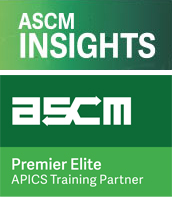2022 was a year of innovation and change at ASCM. Not only the SCOR model got updated and reworked into a digital standard, also many other smaller and bigger changes and innovations have been made available to the global supply chain community. I have consolidated the most relevant topics into a short overview:
- SCOR model changes:
- Free access to the SCOR model: The model is no longer only accessible to ASCM members, but also open to the public. You can explore it here.
- New SCOR Digital Standard (DS) model: The updated model integrates sustainability standards and optimizes supply chains to improve business performance. Developed by a diverse group of subject matter experts, the new SCOR DS updates processes, metrics, skills and practices to ensure coverage across multiple industries. Additionally, performance metrics and practices have been reviewed and revised to give organizations new ways to measure and improve their supply chains.more
- As consulting partner of ASCM, PMI is guiding and supporting its customers in transforming their supply chains through education and advisory. Contact us for more details.
- New education programs: A set of new education programs has been released in 2022 and can be accessed through PMI:
- Launch of eLearning suite “Foundations of Supply Chain Management (FOSCM)”: The program consists of 45 different modules that students can choose from foundations of Inventory Management, Distribution & Logistics, Operations Planning, Manufacturing Management, Managing Operations, and Supply Chain Principles. The module details can be found here.
- Launch of online certificate program - “Supply Chain Planning”, “Procurement” and “Warehousing”: Each certificate program features 20 hours of educational content to help individuals build fundamental knowledge in either supply chain planning, procurement, or warehousing and will be completed with a final exam online. The self-paced, online programs are targeted at entry-to-mid-level supply chain professionals looking to build on their current supply chain knowledge or get familiar with a critical supply chain function. more
- Changes in existing education programs:
- Elimination of CSCP eligibility requirements: The APICS CSCP certification still had a set of eligibility requirements as entry barrier to this certification program. As of December 2022, these requirements have been eliminated and there is no more eligibility application for any of the 3 certification programs (CSCP, CLTD, and CPIM). more
- APICS CPIM reconfiguration and retirement of Part 1 and Part 2 classes and exams: From 2023 onwards, the Certified in Planning and Inventory Management (CPIM) will only be one course and one exam. The former Part 1 and Part 2 programs and exams will slowly be retired. Contact us for more details and remaining training options.
- APICS CSCP/CPIM/CLTD certification program and exam prices will increase in 2023: ASCM has announced a price increase of its 3 major certification programs from Feb 1, 2023, onwards. If you plan to start your certification journey, save money, and start in January 2023!Contact us for more details.
- Outlook and new development:
- “Supply Chain Stability Index” in collaboration with KPMG: The launch of this monthly index provides indicators viewed as helpful in assessing how well the U.S. supply chain deals with the ups and downs of market volatility. It also serves as a forecast for the global supply chain behavior. The Supply Chain Stability Index uses machine learning and statistical models fueled by market-level supply chain data to provide insights into performance variability and projects an outlook for the near-term. The report identifies three key drivers of supply-chain stress: Logistics, Transport, and Workforce. more
- ASCM Enterprise Certification for Sustainability: This enterprise certification recognizes supply chains that meet the process, people, practices and performance standards for ethics, sustainability, and economic responsibility. Becoming certified distinguishes your organization as a category leader in ethical, economic, and ecological practices. more

